First published in Rip It Up, May 1986. All uncredited photographs © Chris Bourke
--
Small pubs, small towns, a hot band: the Dave Dobbyn and the Stone People tour. The theme, they said early on, was “Been a long time since I rock and rolled.”

Dave Dobbyn and the Stone People at Coronet Peak, April 1986. From left: Bruce Adams, film sound; Gary Verberne (crouching), guitar; Dave Dobbyn; Chris Bourke, journalist; Peter Janes, cameraman; Roger King, manager (in front); Peter Warren, drummer; Ian Belton, bass.
A return to intimate venues, playing places that never see a name band. Get off the beaten track, see some sights ... hey, we’ll film it for Radio With Pictures, and throw in some mountain shots for overseas. At the same time, break in the new, stripped-down DD Smash, in the best way possible: on the road. Doing old songs and new, plus some classics for fun.
Great concept, great film ... shame about the box office. A soulful new song in the set, the film’s title, took a grim significance: ‘Hell Takes No Holiday’.
Somehow, in the enthusiasm for the idea, the reality of going back to one’s roots was forgotten. Small towns equals small crowds. Touring costs remain the same. Places unused to visits by name bands – we know now – aren’t hip to the in-joke of a pseudonym. Okay to play it low key, but not too low key.
“Someone told me DD Smash played here last week. In this town! Damn! No one told me – they were supposed to be hot!”
When I join the caravan at Invercargill a week into the tour, the mood is up. Okay, says Roger King, Dobbyn’s manager, as he buys me a Speights, the pub manager has sold your bed, but otherwise, it’s all been going fairly much as planned. The band has clicked, we’re having a great time, and the film should be a cracker.
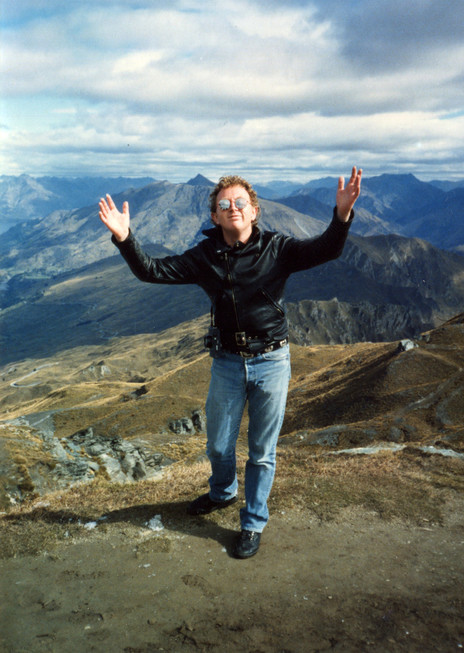
Dave Dobbyn on Coronet Peak.
The band arrives, in high spirits after their hotel meal, and the stories start. Oh, you should have been in Dargaville, the first night was crazy. Taupo, where the fish were jumping. Motueka, harvest time. A day on the lake at Wanaka, sailing, paragliding. Okay, there’s been the odd gig that looked dodgy, but they came right. In Kawerau the pub manager had changed and he didn’t know we were coming. No ads, posters up, nothing. And he said he wasn’t happy! But we whipped round to the radio station and did a quick interview. Got 140 people in the end.
Last night in Balclutha looked really bad ... we walked in to the town hall and there were only a couple of dozen people there! But it turned into a great gig; the band went round introducing themselves beforehand ... and they went bananas at the end, the whole Who bit: feedback, instruments everywhere. For only 42 people!
Now, says King, did we make any arrangements as to who pays for your accommodation?
Have Lion and Dominion Breweries developed in their chemical labs a special formula for pub managers? To be cloned, along with their decor, throughout the country? The standard model is wider than they are high, chatty with the locals, but with a sour look towards the band that says: “I’m only letting you play here under sufferance.”
As the people stream in, Invercargill’s publican becomes more friendly; it’ll be a good night, for a Wednesday. But don’t get cocky: “When Peking Man passed through here, they started queuing at six pm. Things are a bit slow tonight. All the freezing works around here have been on strike for six weeks. That affects everything.”
Thanks. The crowd comes in dribs and drabs after sitting in their parked cars for ages. A few are interested in the merchandise for sale at the door, after fairground cajoling from road manager Mike “Snapper” Knapp; “T Shirts! Posters! Photos!” Roger King stands to one side, discreetly taking a tally. 230 – just over the 200 mark needed each night to break even.
The band wander through, and at 8.30pm sharp the gig begins, with ‘Love You Like I Should’, a new Dobbyn song first aired on Rock on New Zealand. The crowd disappears in the large dark room, packed around the bar. In front of the small stage is a wide open unused space: the dance floor.
It takes several songs for the crowd to edge forward, clutching their drinks. They listen to the slow, countryfied ‘Be Mine Tonight’ without showing any recognition, along with the new ‘Unbelievers’ and ‘Steal Yourself Away’.
Finally, after four songs, someone breaks out and actually dances to the classic rock’n’roll beat of David Lindley’s ‘Mercury Blues’. The evening is underway. The dance floor quickly fills for the familiar ‘Save Yer’, ‘Outlook for Thursday’ and ‘Whaling’ ... but suddenly there’s a power cut, and the band is left stranded and impotent, strumming mute guitars.
In vaudeville tradition, Peter Warren keeps a rhythm going on his drums so the atmosphere is not completely lost. But after five minutes the band members resign themselves that it’s going to be a long one, and they drift off the stage towards the bar.

Peter Warren on Coronet Peak, April 1986.
Twenty minutes later, power restored, the band retakes the stage and tries to recapture the mood. No problem; with a sure-fire classic like ‘Not Fade Away’, the spirit quickly returns, enhanced by the setback. More DD Smash favourites, and covers (a Shadows guitar medley, Doors, Ike and Tina) are pure crowd pleasers and the audience is well satisfied when the band plays on and on, compensating for the shared disappointment with greater exuberance. For the final encore, Peter Warren takes the mic for a powerhouse performance of ‘Been a Long Time’, his Robert Plant voice made for heavy metal.
It’s been a memorable night, and 50 locals stay back for an after-hours session in the bar lined with rows of personal beer handles and photos of trotting greats. The band mingles and small talks in their stage gear, coming down slowly. Among those present are the local heroes, Vision, a band that’s been together 17 years. Many small towns have a similar band of extraordinary longevity and pedigree; players have gone from Vision to the Little River Band, Jon English, Link, Chapta ... “and Murray Burrrrns to Mi-Sex,” says the barrel-chested vocalist (a mere 13-year veteran).
“Welcome back to band meals,” says Snapper the next morning at breakfast. The cook, also a hotel standard issue, takes our orders with a cigarette hanging from her mouth. The menu says, “Bacon and Eggs – scrambled, poached, boiled, fried.” I ask for bacon and eggs, scrambled, and when it arrives I recall one of the rules of the road: reinterpret all menus – the locals can have a completely different idea of something as simple as “tea and toast”.
Dobbyn and Snapper laugh when the meal comes: they’re wise to hotel culinary idiosyncrasies. It’s bacon and eggs all right – fried eggs, piled high on top of scrambled eggs. Exactly the meal John Cleese received in Southland 20 years ago, which inspired him to create Fawlty Towers.
Also breakfasting are new Smash guitarist Gary Verberne (ex-Graham Brazier’s Legionnaires), and bassist Ian Belton (from Australia, ex-QED with Jenny Morris). Plus ... the Invercargill pilgrim. Every few towns there is a new variation, a dazzled fan who has a vision like lightning: give it all away for rock’n’roll: “I’m coming with you!” In Taupo it was “Jah Destiny”; in Motueka, “Joshua” who sold his valuables, gave the band his remaining belongings in a beer crate and said, “I’ll meet you in Greymouth.”
If refusal is too abrupt, there is the possibility that the pilgrim could get nasty. So until the last minute, the bands are usually polite but gently discouraging. Then they can truthfully say, sorry mate – there’s no room.
Invercargill’s pilgrim was the stayer of the party the night before, coming back to the hotel room in which half-a-dozen people continued to yarn. As all the others left, he sat bleary-eyed and incoherent, only getting the message when the room’s occupants brushed their teeth and changed for bed.
Next morning he was still there, having spent the night in the hall. (The film cameraman Peter Janes, having gone out visiting, had discovered him in his bed at 2am.) And now here he was at the breakfast table, still bleary-eyed and incoherent. “I know: drop me off in town and I’ll pick up my car and see you in Queenstown.”
No reply. Five minds weren’t listening. They were wondering, “Who’s paying for that breakfast and how do we get rid of him?”
“Hang on. My car’s playing up. I know – I can come with you!”
The eight-seater van did leave for Queenstown with nine people, however, the extras being King, Knapp and “the media” – cameraman Peter Janes, film soundman Bruce Adams, and myself. The van was bugged for the film soundtrack, so the tour had its own anti-swearing campaign; any obscene language earned a tap on the head. Peter Warren was the most vigilant campaigner, though he was kept busy.
While the road crew headed straight for the venue in their truck to set up the next concert, the band could take their time doing a Tiki Tour for the camera. Every few miles some local colour would cry out to be filmed, with Dobbyn and Warren, natural actors, taking lead roles: Warren doing high dives into rivers, Dobbyn playing a gauche American tourist at the Kingston Flyer and other attractions.
The camera was the golden ticket to Queenstown, opening any door in the tourism-conscious region when combined with the charm of Janes and the patter of King: “Ah, we’re making a film of DD Smash touring the country. It’s going to be shown on television here and overseas. Would you like to be in it?” Sure, hop aboard (the chairlift, jet boat, yacht, launch, even – in Waiouru – a tank). But nobody was prepared for the breath-taking view at the top of Coronet Peak. When the caretaker offered us coffee in her hut, the band responded with tickets to their show, before sliding down the mountain on snow-trolleys (Warren, naturally, without brakes).
Even more exhilarating was jet-boating on the Shotover River; the boatman was a total cowboy playing up to the camera, describing the engine’s capabilities while careering straight for stone banks, missing by millimetres, then doing a 360-degree spin. “Whew – almost lost it there,” he’d say to his paralysed passengers, as a boatload of Japanese tourists whizzed by, looking equally green.
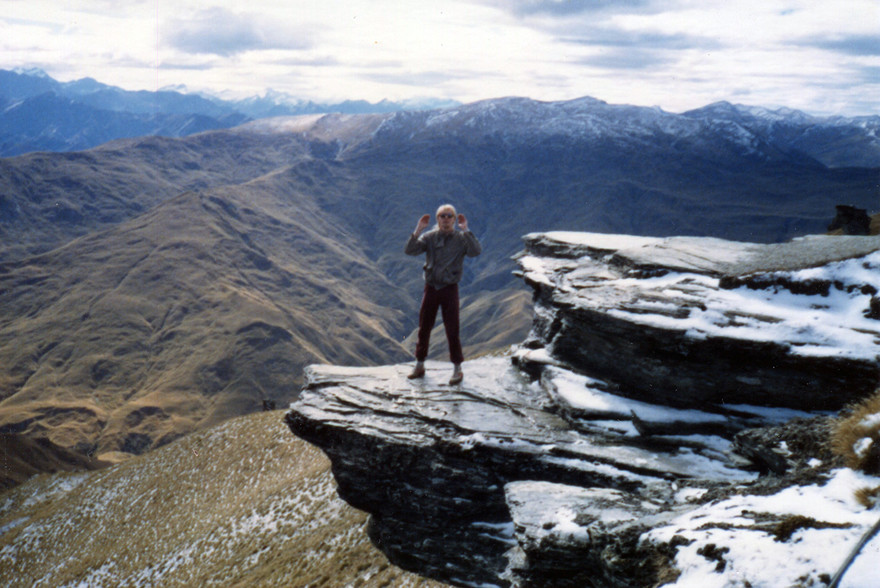
Gary Verberne checks out the reverb, Coronet Peak, 1986.
Queenstown is not a place of happy memories for Dave Dobbyn, however. He spent his honeymoon there, in hospital, groaning with the agony of appendicitis. He almost had another story to tell about the town when, given the driver’s seat for 30 seconds, he failed to give way to a police car and a traffic cop ... “They won’t let me drive,” he’d complain to the audience each night.
The billboard outside the Queenstown nightclub in the heart of the tourist village boded well: TONIGHT! DAVE DOBBYN & THE STONE PEOPLE!
But once again, the timing wasn’t quite right. In Greymouth, the band played at Easter, when the town was on holiday – elsewhere. In Queenstown, where the wealthy tourists flock to the lakes in summer and the ski-slopes in winter ... it was autumn.
So it was mainly locals who came that night, a few paying out of their wage packets, many using the free passes given out during the day’s joyriding, and still more coming in courtesy of the nightclub owner. “I’ve got to look after my part-time staff, you must understand.”
It was a tense Dave Dobbyn who took the stage in Queenstown, after emptying his stomach in the bandroom. Perhaps it was something he ate in the mediocre Mexican restaurant. But, as with the power cut in Invercargill, the band having to rise above a negative situation sharpened the performance. It was as though they’d said to themselves, you can’t show the audience we’re disappointed, that’s ripping off the ones who actually paid. The whole band, and particularly Dobbyn’s singing, had bite.
‘Magic What She Do’ was pure magic. On radio, the song sounds almost as lightweight as an orange juice commercial, but live, it’s a vehicle for Dobbyn’s remarkable voice. It seems capable of anything, from a macho baritone to a poppy falsetto, wails, shrieks and cries. He pours out the soul, the little man with the big heart and 100 faces: the romantic, happy and sad, but always the optimist and ‘The Pleaser’.

Doppelganger? Dobbyn with his Queenstown lookalike, Steve Harvey (at left). - photo by Ken Maurice.
It’s one of those transcendent moments when a song’s performance leaps out of the concert. I catch Roger King’s eye; he spotted it too. Then, looking around the audience, I do a double take. Standing beside me is a Dave Dobbyn lookalike: the same profile, high forehead and curly hair. Several times during the evening I see him again, each time thinking, “Dave didn’t tell us he had a brother in Queenstown.” He was actually a local builder called Steve Harvey, and after the concert he introduces himself to Dobbyn and they get their photo taken together by the nightclub’s photographer. Harvey seems resigned to living with such a familiar face: “It doesn’t worry me at all, I can cope,” he says. “I’ve got used to it.”
The locals yarn with the band afterwards, appreciative that they’ve come to their town, and sympathising that the crowd wasn’t larger (once again, the 200 mark was only just reached). It’s the transition season, Harvey explains. “If you’re in Queenstown at this time of year, you’re either a builder, rafter or waitress.”
Outside, Lake Wakatipu is still and dark. Looming high above the town, lit up in the blackness like some huge space station from a video game, is the restaurant reached only by gondolas: the “marae in the sky”.
MEMO
Things to remember
1. Look for Halley’s Comet, while we’re out of the big cities
2. Try the legendary Hangover Cure – champagne, with a sugar cube dosed with bitters.
The exhaustion sets in during the long haul in the van the next day, through the dead hydro lakes of the Mackenzie Country to Ashburton. The scenery for passengers is limited to the white line and thousands of fence posts alongside the road, so Ian Belton (“the Australian in the group”, as Dobbyn introduces him each night) is given the driver’s seat with the best view. As the energy levels ebb and flow, the conversation turns into long periods of silence, as the fellow travellers sleep or catch up with their reading.
The cocooned environment of a touring band is a stimulating insular world of in-jokes and incidents. What goes on outside is irrelevant and ignored. The things that matter on tour are few and contrary to the rock’n’roll myth, sex and drugs are well down the list of priorities. Each day, the same mundane questions are asked: What’s the food like? (Usually lousy: instant coffee, tasteless coleslaw, gravied mutton or ham steaks, and chips with everything.) How’s the door-take going? When will the first person get up and dance? (Once the ice is broken by a brave couple, the dance floor fills quickly, and the band loosens up.) And, most important, will the hotel open up the house bar afterwards? Then, the uppers can be celebrated and the downers forgotten.
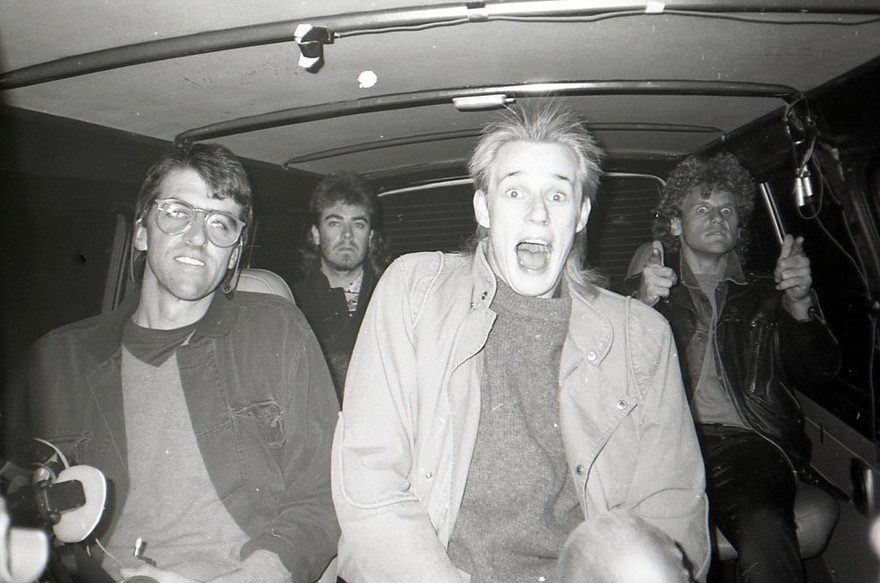
Oh no! Dave's driving! (L-R): Peter Janes, Ian Belton, Gary Verberne, Peter Warren.
Arriving at the Hotel Ashburton, the band strategically stays in the van while Roger King goes in to sort out the accommodation. Owned by the Ashburton Licensing Trust (the town was dry for many years), the hotel could be any one of the concrete DB complexes around the country – none of which welcomes bands with open arms. The usual treatment is to stick them in a wing miles away from other guests, insist that they are staff members, eat in the staff-room, don’t use the house bar and don’t have any parties in their rooms. The Hotel Ashburton doesn’t go that far, but, there is a vibe ...
“It’s quite a hoony town, Ashburton,” warns Gary Verberne, who as a Christchurch-based guitarist played all over Canterbury. “Tonight’s Friday night – you can expect some aggro. There are a lot of bikers around here – maybe it’s the straight roads.”
Sure enough, there’s a fight outside before the concert has even started, a knife is removed from a patron, and the police are called. But, being a venue close to a big town, the crowd is blasé about the concert, there is no reaction until ‘Outlook for Thursday’, when the dance floor fills instantly. “The hit-single reaction is frightening to watch in Australia”, says King, “it’s like flies to a corpse.” The dancers, male and female, are big and out-of-it. The ‘Outlook’ singalong (“otherwise fine ... otherwise it’s dandy”), some nights inspirational, sounds like a tired routine. Dobbyn’s annoyance at the apathy of the crowd begins to give his guitar lines a harder edge. It turns to anger backstage when the crowd takes it for granted that there’ll be an encore. It’s a two-way thing; the band has worked hard, how ’bout some appreciation? Snapper, clutching the door-takings in a money bag, leaps on stage and grabs the mic. “Ashburton! Do you want some more? Let’s hear it for Dave Dobbyn and the Stone People then!”
It’s pure showbiz, but it works perfectly. “Been a long time since I rock and rolled ...”
Afterwards, King and Dobbyn are denied service in the house bar. “We don’t serve people like you,” says the bartender. “People like us?” says King, relishing an argument with absurdity. “Now who are ‘people like us’?” There’s no point in persevering, though. She’s sticking to “the rules” ... and besides, who wants to drink stirred martinis with no olives?

Joshua the Motueka pilgrim, near Kaikoura.
So the band and three or four friends are forced to retreat to a hotel room and drink from the mini-bar at inflated prices. They yarn and watch INXS on 12 O’Clock Rock, delighted at the success of upwardly mobile Kiwi-in-Oz Jenny Morris, now almost a permanent member of the band. The soirée is interrupted however by a knock on the door.
It’s the manager, yet another obese specimen, asking for Dave Dobbyn, the drawcard responsible for the evening’s high bar-take. “The police are on their way,” he says. “Hide any drugs you might have, and go to bed.” The tactic is heavy-handed, but it works perfectly. Life’s too short to battle with a Canterbury redneck.
Gary Verberne, although from Christchurch, is one of the gentlemen of New Zealand rock music. He seems to have relatives all over the country, and his parents come down to Ashburton to see his latest band. Anything but Verbose (as Peter Warren has nicknamed him), he’s sad to be leaving friends and family behind, but plainly rapt to be joining DD Smash. “This is a dream come true”, he says in a husky voice. “Dave’s amazing, man.”
Jerry Jeff Walker’s ‘Up Against the Wall, Redneck’ is the soundtrack to the trip north alongside the Kaikoura Ranges. Dobbyn points out the roadside phone-booth where DD Smash Mark I heard that the Cool Bananas album had hit No.1 in its first week. Roger King looks up from his Kafka short story to see a motorbike passing the van. The pillion passenger is waving while grinning broadly.
“Shit!” he says, ducking down. “It’s Joshua!” The Motueka pilgrim has caught up with the tour again, undoubtedly heading for the Blenheim gig. He might even want a final decision on the contract he offered the band to record an album live in a Napier church. Happily, when we stop in Kaikoura for a beer and some crayfish, he tells us he’s got a job down south and is heading home to sort things out.
The Raffles Hotel in Blenheim supplies the best meals of the tour, smoked-salmon entrées even, and the staff has worked hard to set up the gig in a small country hall a couple of miles out of town. “Dave Dobbyn and the Stone People live at the Grovetown Hall” attracts all sorts out of the cold Marlborough night, with a heavy percentage of bikers and hippies. When the band arrives at 9pm there is a line of 25 large bikes outside, all Triumphs, Nortons, Harleys. Inside, the air is already fetid with smoke. In the kitchen are 100 dozen cans of DB for the thirsty. Have you heard the news? There’s good rockin’ tonight.

Grovetown Hall, Marlborough: there’s good rockin’ tonight.
The band are in high spirits even before they hit the stage, and the audience is appreciative – although no one makes a move until well into the concert. The air is stifling, and it’s so hot that Peter Warren’s drums keep going out of tune. It’s a guitar-happy crowd, and Dobbyn senses it, stretching and stretching his solos until finally going over the top with Th’ Dudes’ celebration of drinking, ‘Bliss’: “though you’re already legless, get yourself another ...” He leaves the stage with his guitar still shrieking feedback and those in the audience who aren’t catatonic are pleading for more. There has been over two-and-a-half hours of ear-piercing guitar music bouncing around the shiny walls of the small hall, the half-dozen nice Marlborough gels in their pearls left an hour ago and the floor is covered with 100 dozen beer cans. The best night yet, and collapsed out the back in the band room/women’s toilets, the band agrees.
The next day, Sunday, is the only one of the tour without a gig. By now we’ve hit “road mode” – one doesn’t notice the exhaustion anymore, the body and mind are on cruise control, running on empty. The day is killing time in Picton, waiting for Railways employees to grant entry to the ferry. We kill time eating awful bacon and eggs (and chips) and, with bored disinterest, watch speedboats race in the harbour. Suddenly, two of the boats collide and flip high above the water, and a search party is called out to look for the boatmen. It’s horrifying, but somehow so much like television that it was almost expected. “This is why I gave up TV work,” says Peter Janes. “News. Too many gruesome stories.” Janes, now a freelance cameraman in Sydney, has worked in TV and film for nearly 20 years. In that time he has been involved in many of the classic New Zealand rock videos: he filmed The Fourmyula plucking leaves in the Wellington’s botanical gardens for ‘Nature’, Toy Love standing on a grave in Dunedin (a clip for which the TVNZ director-general apologised).
On the ferry, Janes’ carte-blanche camera works wonders again, securing a “film room” for the voyage. Poker and vodka mean the band isn’t seen until Wellington. Nearing the heads, Janes goes up to the bridge to “pay the rent” filming the misty entrance to Port Nicholson. Dobbyn’s old pardner Tex Pistol turns up at the Wellington motel in silver-capped boots, having booked a chuckwagon for an evening toasting George Jones: “I really had a ball last night, feeling single, seeing double ...”
Monday night’s concert is in Masterton, reached after a two-hour drive over the Rimutaka Range. The venue is found after much Spinal Tap confusion (the heavy metal spoof is so true-to-life it’s not just hilarious but depressing) ... and it’s another concrete accommodation complex, with the band’s rooms driving distance from the rest of the motel. A handbill in each unit advertises next week’s attraction: Mike Stand and the Amplifiers.
Dobbyn heads for the radio station for an interview, recalling an occasion when he and Gary McCormick did a radio interview down south. The DJ – on air – said to McCormick, “I saw you often in Th’ Dudes, I’ve got all your albums.” But this time it’s fairly straightforward, Dobbyn outlining his future plans: back to Sydney to finish the Footrot Flats soundtrack and record an album with the new DD Smash. A single in August, then a major tour, and – possibly towards the end of the year – a month’s residency in an Austin, Texas bar, testing the American waters.
Monday night in Masterton is obviously not a happening scene, however; only 145 people enter the hall of tacky mirrors. Wairarapa is a hot, dry climate, and it’s hard to get people moving during harvest. “Come on!” exclaims Dobbyn, “ya scared of parquet?” So the band switches to auto pilot, and the highlight of the evening is Dobbyn’s new country song, ‘Unbelievers’: “I wonder how do you fake it?”
“Stiffy Dobro” has become a grim nickname. Roger King decides to fly to Auckland after the next gig to organise an extra week for the tour in slightly larger centres.
In the truck with the two roadies on the way to the Ohakea air base the next day, soundman Mark Stewart says the downturn in the live rock scene is well entrenched to the point where, “It’s just not as fashionable to go to a pub and see a band as it once was.” Your more fashionable people – the market leaders, so to speak – don’t want to spend an evening with drunken out-of-it hoons,” he reasons.

Just flew in from LA: Dave Dobbyn at Ohakea air base.
That night at Ohakea, I could see his point. It was quite a different concert when half the crowd wasn’t vege-ing out. The band was in high spirits too, after a day’s tour of the base with a keen-to-please entertainments officer. “We asked to go up in a Skyhawk,” Dobbyn tells the clean-cut audience that night, with a wild grin on his face. “We’re thrillseekers. But no one was game to take us.”
Mingling with cadets in the foyer, I hear about an RNZAF prank that’s sure to work. Between songs I tip Dobbyn off about two words he must say. He has no idea what will happen, but when the dance floor is full, and the camera is rolling, he calls out, “Dead Ants!” ... and instantly 100 of the country’s finest cadets, male and female, fall flat on their backs and wave their limbs in the air.
Dobbyn stands open-mouthed, dumbstruck at what he’s done.
Still selling at the door, Mike Knapp is never lost for words. “Sir!” he accosts a cadet, waving a black T-shirt. “Look great in the bomber tomorrow!”
Breakfast in Marton, Bruce Beetham country, and time to wander down the street and meet some locals. One approaches Dobbyn. “Hi, Dave,” he says, “I used to be into music and rock’n’roll and drugs ... now I’m a Jehovah’s Witness. Are you interested in living in paradise forever?”
“No,” says Dobbyn. “I just bought a gun.”
He had, too: an air pistol reduced from $99 to $50. Meanwhile, the band members find a bookshop selling Playboys for 50 cents each. So the trip to Waiouru is made in silence, only broken by Ian Belton talking about the guitarist in an Australian country band he once played for. “We’d be driving along the road, and he’d stick his rifle out the window and take pot-shots at bulls’ balls.”
We’re met in Waiouru by another entertainments officer, a sergeant, who has played in bands and eager to please. He has printed special all-access passes for the band, there’s plenty of beer backstage, plus our own sentry. The things that matter have been looked after. Now, how would we like to go for a ride in a tank? Out comes the camera once again, to film Dobbyn-as-Patton, conquering a Waiouru vacant lot.
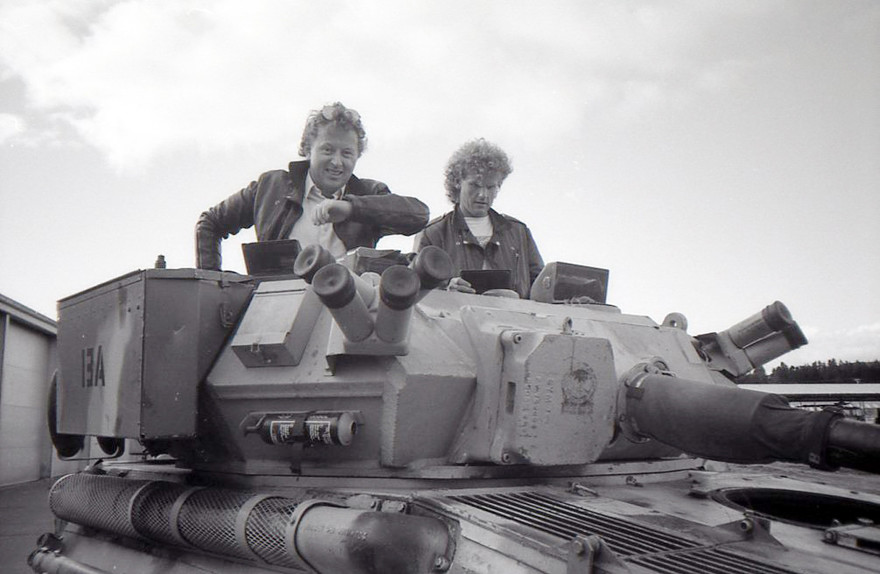
Dave Dobbyn and Peter Warren head for the Desert Road.
Waiouru’s a strange place, an institution pretending to be a town. Standing outside the camp theatre in the early evening, it seems most of the inhabitants march by. New recruits stumble to keep in line on their first attempt, while the naughty boys jog by carrying full packs and rifles ... even those going to dinner march in formation, with only one arm moving. The other arm clutches their knife and fork to their sides.
At five o’clock, in a daily ritual, a lone bugler plays ‘The Last Post’ and, up and down the pavements, the soldiers caught outside snap to attention until the last note dies away.
150 people doesn’t make a crowd in a theatre that seats 700. The clean-cut audience sits still, like Mormons at a rally, until the hit singles come along. At ‘Outlook’ and `Whaling’, Waiouru’s teen population rushes to the front and dances with frenzied enthusiasm. For at least 10 feet in front of the stage, it’s a reminder of the triumphant town hall tours when the singles were peaking.
The band is revelling in it, and Dobbyn in particular hams it up. “Do you remember Daggy and the Dickheads?” he asks. To a cheer of approval, Dobbyn drags a reluctant Mark Kennedy on stage for a duet of ‘Not Fade Away’. The retired dancing master from Taihape may have missed a few words, but he hasn’t lost his rhythm.
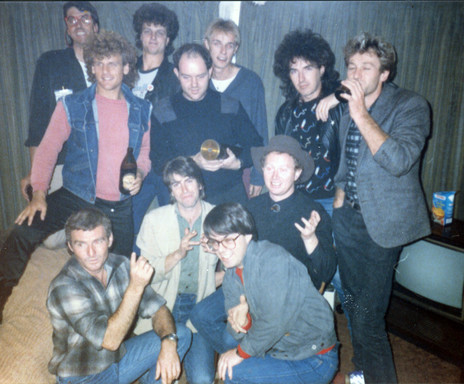
Motel life before Smokefree Rockquest. At the Oasis, Waiouru, April 1986. Standing (L-R): cameraman Peter Janes, drummer Peter Warren, unidentified lighting tech, sound engineer Mark Stewart with artillery shell, guitarist Gary Verberne, bon vivant Mike “Snapper” Knapp, guitarist Dan McCartin. In front: film soundman Bruce Adams, singer Mark Kennedy, writer Chris Bourke, and Dave Dobbyn.
At the end of the gig, Dobbyn is mobbed backstage by half a dozen autograph-seeking 12-year-olds. The organising sergeant has a “Today Waiouru, tomorrow Western Springs” promoter’s glint in his eye, and the two young soldiers who gave Dobbyn and Warren a spin in their tank, shyly make a presentation – a boxful of brass howitzer shells. Afterwards, in the Oasis Motel on the edge of the Desert Road, Dobbyn and Kennedy entertain those present like a couple of Irish raconteurs, while ex-Dickhead guitarist Dan McCartin, explaining the farmer’s plight and its spin-off effect on the region, echoes the familiar theme that we’ve heard throughout the country:
Last year at this time, it wasn’t no joke / My whole barn went up in smoke
And our horse Jethro, well he went mad / I can’t ever remember things being that bad
– The Band, ‘King Harvest (has surely come)’
There is only Matamata to go now before the Stone People tour hits Auckland, and like a horse that can sense it’s on the home straight, the band is champing at the bit to get there. As a final hurdle Matamata really tests their stamina. There’s nothing but disinterest shown by the hotel management – who won’t let the crew set up until the late afternoon – and visiting the main street, which seems full of tea rooms and chemists, it’s noticed there’s not a poster in sight. The band members resign themselves to the inevitable.
The 45 people who come that night disappear into the shadows of the small bar, the band just grin and bear it, put their heads down and play to the exposed dance floor. “It was okay in Balclutha,” says Gary Verberne, “that was a novelty. But not a second time.”
A bottle of vodka may be necessary if an après-gig drink is denied; the hotel’s liquor store is closed, so once the concert is underway I drive over to Matamata’s other hotel. Happy hour is in full swing. Inside are 150 people, listening to a disco.
Returning to the hotel, I go to the room I’m sharing with Verberne. There’s loud banging inside; it’s coming from the bathroom. The door is stuck hard, and Gary is due on stage at any moment. The door doesn’t budge when I pull the handle from my side. I grab a teaspoon and nudge up the pins in the hinges. The door comes away from the wrong side, and the guitarist dashes out and down the hall to the gig.
Outside the venue, a whiskeyed psychopath is on the loose, looking for someone to fight – because he had to pay to see the country’s biggest drawcard in his small town.
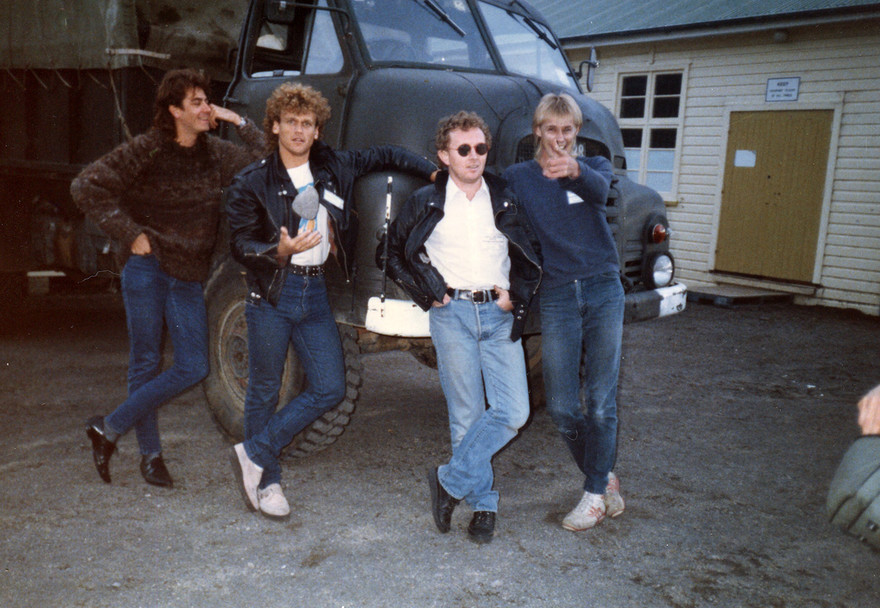
Waiouru Military Camp, 1986 (L-R): Ian Belton, Peter Warren, Dave Dobbyn, Gary Verberne.
The next day, we’re an hour out of Auckland when we finally find a Devonshire tea: fresh scones, jam – and the bacon and eggs doesn’t include chips. When Dobbyn and the Stone People arrive in Auckland there’s a feeling of relief. There’s another week to go, to help pay the bills, but the hard part is over. At Queen Street, the caravan drifts apart. I take my bag, wander across to Darby Street, and climb the stairs to the Rip It Up office; decompression will be needed.
The evening’s concert is in the Mon Desir in Takapuna, Peter Warren’s home turf, and the 450-strong crowd, including Dobbyn and King’s parents, is warmly appreciative (though they weren’t hip to Al Hunter’s country support act). It’s like an old DD Smash gig again.
After the concert, relatives, old friends and musicians gather to welcome the band home. Dobbyn is called away from the hearty gathering; there’s some problem at the door to the house bar. When he returns, Dave Dobbyn, the optimist, the pleaser, is angry (“and when I get angry, the Irish comes out”). In his loudest voice, he cries, “Okay! We’re leaving. Now. They won’t let my brother in.” As one, the party puts down the drinks and leaves – but not without a few heated words at the smug proprietors in their white shoes and blazers. It’s a shock for this sort of thing to happen in Auckland, where many hotel managers have had reason to be grateful for DD Smash’s existence.
In the next week, the band opens the Galaxy, Auckland’s new rock venue, and plays in Rotorua, Hamilton and Whangarei. “Ah, it’s been fantastic, just splendid,” says Snapper on the phone. “You should have been there this week as well, the band is buzzing.”
And it shows. No matter how enjoyable the small towns were, there’s a complete lift in the band’s playing at the farewell gig in a small Auckland club at the end of the week. The band is so tight, they can loosen up with confidence, and Dobbyn continues to amaze with his dazzling vocal improvisations.
It’s been a strange itinerary, but the disappointments are forgotten, and the Stone People tour finishes on a high note, having achieved its aims. The new DD Smash is up – and running.
I remember thinking three years ago that Dobbyn was getting so big that he was lost to intimate venues forever. Ironically, a scaled-down tour was met with disinterest. But the new band and the new songs are now rehearsed (though some of them could do with a more subtle treatment). I’m sure that in the spring they’ll be back, with another hit single and a major tour. As Peter Warren says, “This is my 38th national tour since I started playing in bands. It has to happen soon, I can feel it”.
--
See also: Dave Dobbyn, a Heartland Photo Album, 1986